How can aspiring solicitors gain a foothold in a profession that is perceived as elitist and how can legal employers change that perception? Eduardo Reyes reports from the latest Gazette roundtable.
Any lawyer who attended a leading university in the early 1990s might have picked up on the angst apparent at these institutions with regard to social mobility. Put simply, the worry was that selection processes produced an intake that reflected privileges of income and selective education above academic potential. It is a concern that continues to the present day.
Fast forward a generation or so and a similar anxiety is evident in the legal profession, which shares many of higher education’s problems in this area. Chief among those are how the profession ought to discern true potential when faced with fierce competition at its entry point; and how to attract the best people amid inequalities in society that are not of the profession’s making, and which are beyond its ability to fix.
Recent research by educational charity the Sutton Trust once again showed how enduring is the challenge. Top solicitors, judges and barristers are still disproportionately privately educated and attended the leading dozen universities – particularly Oxford and Cambridge. Four out of 10 partners at London law firms went to a private school, compared with 7% of the general population. And the position has not changed significantly in the last 15 years.
‘We can’t get away from the fact that this is a very hard profession to get into, and one shouldn’t be ashamed of that,’ Barry Matthews, director of legal affairs and third-party sales at ITV, observes. Yet Matthews, founder of the Legal Social Mobility Partnership, stresses that a focus on diversity and social mobility in the law is not about levelling down, but improving excellence.
The obstacles to realising Matthews’ ambition of wholly equitable recruitment are formidable – a fact of which he is fully aware, having grown up in a council house household. Removing these obstacles involves changing not only selection criteria, but also the inbuilt assumptions of those hiring, and the attitudes and aspirations of the ‘capable’ but disadvantaged people who might thrive in the law.
Rachel Nir, a former City solicitor turned academic at the University of Central Lancashire (UCLAN), notes that the students she teaches who aspire to enter the profession are sometimes naive. ‘Our students come in wanting to do law,’ she says. ‘[But] they have no idea how elitist and barrier-driven the profession is. They come in with modest grades, from modest backgrounds. But perhaps a teacher has said, “You’re a really good debater, you’re a really good arguer, you might like law”.’
Nir points to materials UCLAN has designed to teach students about these barriers and insists that confronting these matters honestly is the only way to secure results for those students who are seeking a legal career.
‘They begin to understand the employer’s perspective,’ she explains. ‘We have to achieve a balance between giving them a “reality check”, and then picking them up and saying, “here’s what we think you can do, and here’s how you can help yourself”. My difficult task is making them alive to this, without them thinking that decent graduate legal work is really not a possibility.’
‘The law is an elite profession,’ Anthony Gold’s Donovan Lindsay notes. ‘I think everyone should just accept that, it’s like the “elephant in the room”. Notwithstanding that, it doesn’t mean it should preclude anyone from trying to enter it.’
I would have been screened out by any online process…The firm I started training at read my application, but I had to get in touch with them first because I read the website [thinking] “I don’t tick that box” — Adele Edwin-Lamerton, JLD
For an elite perhaps – but not necessarily elitist, as Roche’s general counsel and company secretary, Funke Abimbola, observes. ‘I don’t think the whole profession is elitist, actually,’ she says. ‘Pockets of the profession are.’
Chris White was a solicitor at Norton Rose Fulbright before setting up Aspiring Solicitors, an organisation which supports undergraduates and postgraduates from under-represented groups who are seeking a legal career. He can draw on the experience of ‘coming from a working class family [and] facing the challenges of getting into the corporate world’.
White says: ‘An individual from an under-represented group may have gone to Oxbridge. If so, they are going to be exposed to a plethora of law firms telling them what they need to do on applications, in interviews and at assessment centres.’
The demographic of student that Aspiring Solicitors is more concerned about would be ‘the individual from Northumbria University, or Brunel, who is studying at that university for a variety of reasons’.
White notes: ‘The time it takes to assist that individual to achieve their potential is 10, 20, 30 times greater than it will be to assist someone who has everything at their fingertips.’ One route to success is putting students ‘in an environment where there are people around they can be inspired by’, he adds. White cites such institutions as the Manchester United Foundation, which works in disadvantaged parts of Greater Manchester to educate and inspire young people.
White stresses the importance of thinking about the profession in the round. Aspiring Solicitors has 20,000 members, he notes: ‘Will all of those people get a training contract at Baker & McKenzie, or Linklaters, or Freshfields? Of course they won’t. But could they get training contracts at high street firms, at regional firms? Yes, because not every type of person will want to be a certain type of lawyer.’
He adds: ‘What our profession should have responsibility for is ensuring we help individuals achieve and maximise their potential. Potential to work at Baker & McKenzie is very different to potential to work at a high street firm. But does it mean that we should no longer focus on the individual who wants to end up at a high street firm? Definitely not.’
One reason, perhaps, why the City and international echelon is seen to bear a heavier duty to promote diversity than in the past is because opportunities elsewhere in the profession have diminished.
Monidipa Fouzder, Law Society Gazette; Eduardo Reyes, Law Society Gazette; Keith Etherington, Slater and Gordon; Adele Edwin-Lamerton, Junior Lawyers Division; Leila Lesan, The Law Society; Rachel Nir, University of Central Lancashire; Funke Abimbola, Roche; Chris White, Aspiring Solicitors; Barry Matthews, ITV, Legal Social Mobility Partnership; Ty Jones, DWF; Debo Nwauzu, BLD Lawyers, BLD Foundation; Donovan Lindsay, Anthony Gold Solicitors; Robert Bourns, TLT Solicitors; Justine Thompson, Baker & McKenzie; Marc Zao-Sanders, Access Professions; Kathryn Davies, The Sutton Trust
As Slater and Gordon senior associate Keith Etherington, also a Law Society social mobility ambassador, says: ‘Half the problem is that the high street firms no longer have the ability to give decent work experience in the way that they used to, because the pressure on them is colossal.’
Etherington himself spent 26 years at the Oldham firm where he did work experience aged 15: ‘I followed a chap to the magistrates’ court two or three days; and I went to the county court every day. Within two weeks I saw pretty much everything that I could possibly want to see.’
The work experience now available to a student at a high street firm is, says Etherington, of a type that offers less insight into the work of a lawyer.
Other opportunities have opened up to gain the rewards a career in the law can bring as the profession has liberalised. These include those arising in alternative business structures and other innovative legal business models; routes that may not filter people out of the sector before they have managed to gain a foothold.
Ty Jones, director of corporate social responsibility and engagement at DWF, says: ‘We’ve got to recognise that the nature of the work that law firms are doing now is fundamentally changing, partly driven by the client and partly by technology.
‘We still have a culture in the law firm where partners in particular would shape what they think talent “looks like” to serve their clients. Actually, this is probably out of step [with reality].’ Less traditional skills will be needed by law firms, he suggests, ‘to be sustainable and ultimately more profitable’.
Robert Bourns, senior partner of TLT Solicitors and vice-president of the Law Society, believes it is wrong to think of progressing social mobility through traditional routes in large commercial firms as an intractable problem. ‘I’m concerned at the suggestion that a particular, City-focused environment is less accessible – that people from a particular background may have less ability to access it,’ he argues. ‘It goes to [the] point made about spending time raising confidence, whatever the [candidate’s] background. It’s just making sure that the lack of confidence and other barriers are overcome.’
Getting through the door in the first place is the most prosaic of those barriers. One recommendation of government social mobility ‘tsar’ Alan Milburn (tinyurl.com/nvktqv5 ) was that there should be multiple entry routes into the profession – a variety of ways to qualify as a solicitor.
Etherington looks at one such ‘flexible’ entry point – the legal executive route. ‘The solicitors’ profession still has a funny perception of the CILEx route, and people who are CILEx-qualified, certainly in terms of parity,’ he observes. ‘We should start to be less embarrassed about that, and go into schools saying there are different routes to a legal career that are now seen as [having] parity. Because you can all be owners of a legal business, earning the same, with the same status.’
Another route is apprenticeships, which has proved attractive for TLT. Bourns says: ‘We were concerned that it was getting increasingly difficult for some people to afford a traditional route in. So we went looking [for them], because we were convinced that we were missing an opportunity to recruit people who were very able.’
Many around the table are involved in working with schools. White says: ‘We need to go out to schools [and] inspire the next generation of the profession to believe that they can achieve their goal. But then we also need to enable a position or a workplace which welcomes them.’
The way this is done is important, Matthews adds: ‘Ensure there’s a legacy – that it’s not just a shot in the arm, it’s not just a talk in a school.’
There is a geographical disparity to overcome too, he points out: ‘As a profession we need to start thinking more nationally. A lot of this [has been] about doing stuff in London.’
Nir cautions against a focus on schools to the exclusion of other approaches. ‘I was a very competent lawyer, I’ve loved law, but I didn’t know at 14 or 15 what I wanted to do,’ she recalls. ‘I probably wanted to be an actress. I’m quite concerned at this idea that we’re “catching” them not even as young adults, but as children.’
Bourns interjects: ‘It’s not because we’re going to try and make them into “clone lawyers”, but because we want to broaden their horizons.’
Earlier this year, a group of firms announced that they would use ‘contextualisation’ data as part of candidate selection. The aim is to gauge a candidate’s potential more accurately by accessing data on what they might have had to overcome to achieve the grades and relevant experience that they have managed to secure.
One such firm is Baker & McKenzie. Justine Thompson, the firm’s senior diversity and inclusion manager, says the business uses a combination of information provided by the candidates and schools-related data from consultancy Rare Recruitment.
‘When candidates apply to our graduate scheme, or to our vacation scheme undergrad programmes, we now have a system which plugs into our existing application tracking system. This gives candidates the option to give us an additional set of data,’ she explains. ‘That data will include some personal circumstances, for example if they were eligible for free school meals.’
This can be combined with schools data, Thompson adds: ‘We will also see the average grades in that school, for that year of study. I worked in graduate recruitment for 12 years and this is a little pocket of “rocket science” that could actually make a difference.’
BLD Lawyers and BLD Foundation founder Debo Nwauzu is another fan of contextualisation; for her, it can help a candidate ‘jump off the page’. The ability to get noticed in an application, she says, is the single most important thing for an able candidate who cannot fulfil a firm’s standard application criteria.
White adds: ‘What the contextual recruitment system actually offers is the potential to see something else, to find something else out in that journey of understanding potential. It’s not an answer – it’s [an extra] tool. As long as it’s used as such, it’s a “win, win”.’
Contextualisation speaks of an attention to detail that is hardly universal in selection procedures, it is noted. Many online application procedures filter out candidates through the blunt criterion of their A-level grades.
Thompson’s firm may read ‘every application from start to finish’, but the logistical challenge of processing applications means many do not.
Etherington recalls one attempt to circumvent such rigidity: ‘I was still involved with the Junior Lawyers Division at the time. I phoned maybe 10 or a dozen firms to say, “Could we send the CVs of the people who’ve successfully got through the LPC, having been Diversity Access Scheme students and award-winners? They’ve already been vetted by the Law Society, [even though] they miss your standard criteria.”
‘They all said they would think about it and get back to me. Not a single one did.’
‘I would have been screened out by any online process,’ Junior Lawyers Division committee member Adele Edwin-Lamerton reflects. ‘The firm I started training at read my application, but I had to get in touch with them first because I read the website [thinking] “I don’t tick that box”. I emailed them, and they said, “Yes, we read everything. Please send it in.”’
Some barriers to entry are based on ostensibly superficial differences between candidates. Accent is one. That is a topic not often discussed in a public forum, but it is germane. ‘People make a judgement about you straight away,’ Edwin-Lamerton notes.
‘I think they do it unconsciously,’ Law Society diversity and inclusion policy adviser Leila Lesan says. Relating conversations with lawyer friends, she says ‘one hit the nail on the head’ by noting that lawyers who had accents that were associated with ‘secretaries and support staff’ struggled to get beyond interview – or if appointed, to get recognition for their work or skills.
‘Do we really believe that people don’t judge people on their accent?’ asks White, who then recalls an incident of conscious bias. ‘I went to a very large US firm [for] an interview. I was interviewed by a partner. At the end, the interviewer said to me, “Chris, your application form’s great. You had a really good interview, but before I put you in front of a client, you’d have to have elocution lessons to learn how to speak properly.”’
‘Soft’ skills are also a factor, acknowledges Kathryn Davies of the Sutton Trust, which provides educational opportunities for young people from non-privileged backgrounds. ‘This year we just found out that of the original 60 students that we took, 30 got vacation schemes and 16 now have training contracts, which is a lot more than we were expecting,’ she relates. ‘We worked intensively with them for a good two years, and that included interview training, application writing, how to walk into a room and make eye contact, and do handshakes.’
Closing the discussion, Marc Zao-Sanders, founder of Access Professions, which promotes university and career opportunities to under-represented groups, calls for better criteria to measure social mobility. ‘If we could agree some sort of indicator, an index for social mobility,’ he says, then the legal profession could talk with much greater confidence about its progress – or lack of it. The profession is still waiting
- This roundtable was kindly hosted by Baker & McKenzie























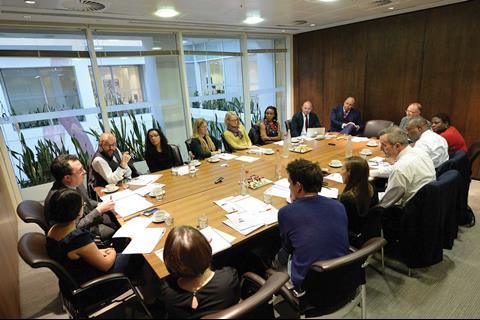
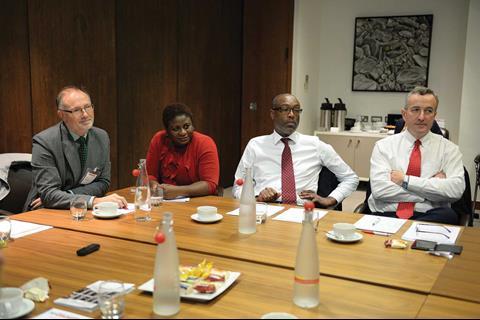
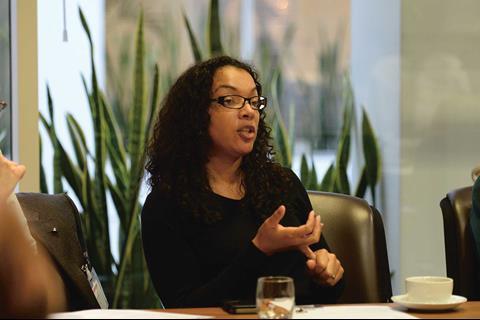
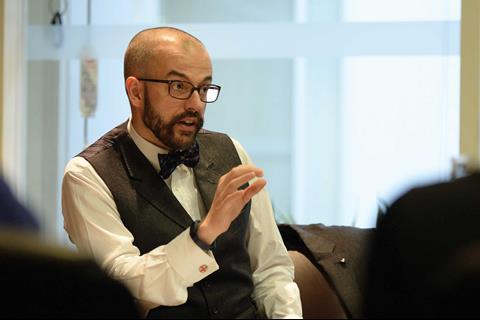
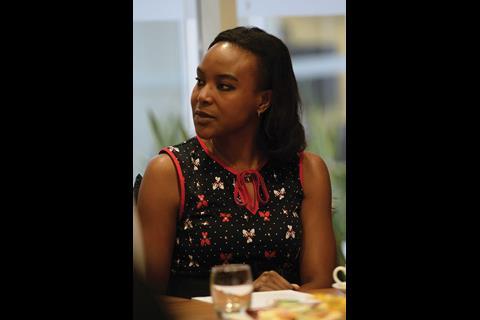








No comments yet